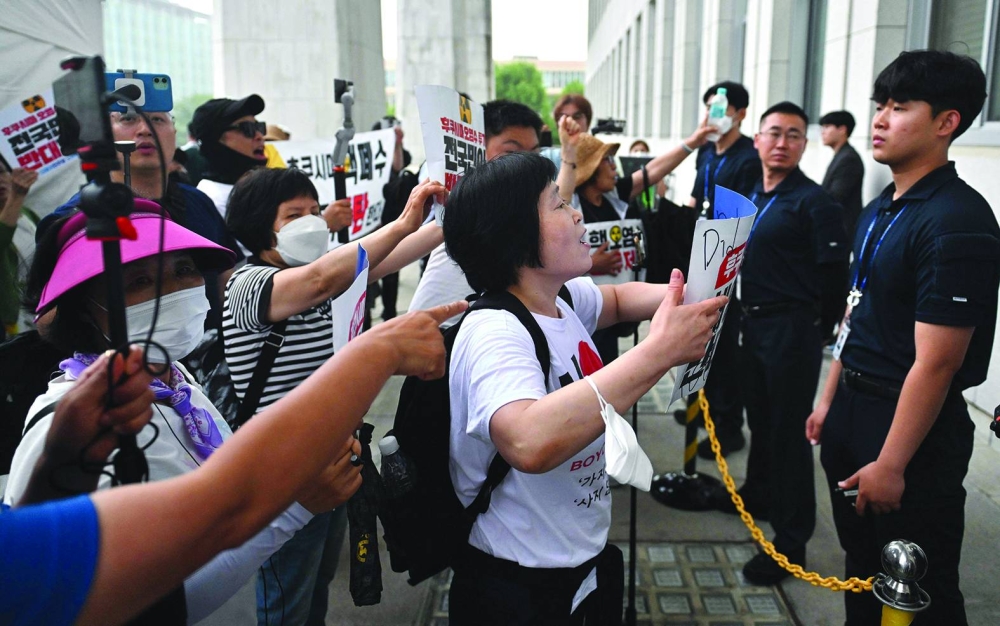It is “absolutely logical” that Japan’s plan to release treated radioactive water from its Fukushima nuclear plant is attracting great interest in the region, the head of the International Atomic Energy Agency (IAEA), Rafael Grossi, said yesterday.
Grossi also said he understands concerns remain over the plan but added that a review by the IAEA released last week found it was “in conformity with international safety standards” if executed according to plan.
Grossi met with South Korea’s opposition Democratic Party members yesterday who expressed strong public concerns over Japan’s plan and criticised the IAEA’s findings.
“The issue at hand today has attracted a lot of interest, and this is absolutely logical because the actions and the way in which Japan will be addressing this... have important implications,” Grossi said in the meeting.
A Democratic Party member who chairs a special committee on the issue said the IAEA’s findings had “shortcomings”, and the widespread public concerns over safety in the country were “legitimate and reasonable”.
“We deeply regret that the IAEA concluded Japan’s plan to discharge contaminated water from the Fukushima nuclear power plant meets international standards,” Wi Seong-gon, the committee chairman, told Grossi.
Grossi was met with angry protests by civic groups as he arrived in South Korea on Friday from Japan and drew street rallies on Saturday criticising the plan.
South Korea’s government said on Friday it respected the IAEA’s report and that its own analysis had found the release will not have “any meaningful impact” on its waters. Chinese foreign ministry spokesman Wang Wenbin on Wednesday criticised the move towards discharging the water and threatened action if the plan should move ahead.
North Korea also criticised IAEA’s backing of Japan’s plan, calling it “unjust” and a demonstration of double standards, citing the UN nuclear watchdog’s work to curb Pyongyang’s nuclear programme.
North Korea has faced UN Security Council sanctions for its six underground nuclear tests.
The release of the treated water will have a “fatal adverse impact on the human lives and security and ecological environment,” an official from Pyongyang’s environmental protection ministry said in a statement carried by the official Korean Central News Agency.
“What matters is the unreasonable behaviour of IAEA actively patronising and facilitating Japan’s projected discharge of nuclear-polluted water, which is unimaginable,” the statement added.
Grossi added that he was aware that one or two experts behind the report greenlighting Japan’s release of treated radioactive water from the crippled Fukushima plant may have had concerns.
“There have been some ideas to the effect that one or two experts would have been against (the report),” said Grossi.
Asked to clarify whether there was concern among any experts behind the report, which included participants from 11 countries including China, the fiercest critic of Japan’s plan, Grossi added: “I heard that being said... but again, what we have published is scientifically impeccable.”
Grossi said none of the experts had raised concerns with him directly and he did not elaborate on how he had heard of the issue.
China’s state-run Global Times newspaper said Liu Senlin, a Chinese expert in the IAEA’s technical working group, was disappointed with the “hasty” report and had said the input from experts was limited and only used for reference.
Liu did not immediately respond to a request for comment.
The taskforce established by the IAEA in 2021 to review the safety of Japan’s plan to release some 500 Olympic size swimming pools worth of water from the plant wrecked by a tsunami more than a decade ago, also include members from Argentina, Australia, Canada, France, Marshall Islands, South Korea, Russia, Britain, the US and Vietnam, according to the watchdog.
Grossi said the report was not formed by consensus and that the group of scientific experts and advisers consulted “may or may not have individual opinions”.
Asked whether the experts were satisfied with the content of the report, Grossi said: “Absolutely, yes. If there’s someone that’s not, they should say it.”
Some 1.33mn cubic metres of groundwater, rainwater and water used for cooling have accumulated at the Fukushima nuclear plant, where several reactors went into meltdown after the 2011 tsunami overwhelmed cooling systems.
The plant operator treats the water to remove almost all radioactive elements except tritium, and plans to dilute it before discharging it into the ocean over several decades.
Grossi said given the low levels of radionuclides in the water to be released, they may be indiscernible a few miles from Japan’s coast.

South Korean protesters hold placards reading 'We oppose the dumping of Fukushima contaminated water into the sea' outside a room hosting a meeting between Rafael Grossi, the director general of the International Atomic Energy Agency (IAEA), and officials from South Korea's main opposition Democratic Party at the National Assembly in Seoul yesterday.
